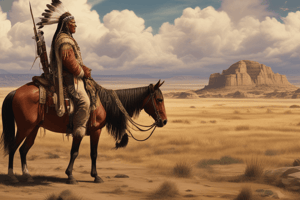Podcast
Questions and Answers
Which civilization is known for its complex irrigation and giant stone structures?
Which civilization is known for its complex irrigation and giant stone structures?
- Ute
- Cahokia
- Maya (correct)
- Chinook
What was the primary religious figure in the Inca civilization?
What was the primary religious figure in the Inca civilization?
- God of Fire
- Inti, the sun god (correct)
- Quetzalcoatl
- The Feathered Serpent
What is a unique characteristic of the Iroquois villages?
What is a unique characteristic of the Iroquois villages?
- Nomadic lifestyle with cliff dwellings
- Constructions of large stone temples
- Extensive fishing villages near the Pacific coast
- Multi-story planks of wood houses called longhouses (correct)
Which Native American group is characterized by an egalitarian nomadic lifestyle in the Great Plains and Great Basin region?
Which Native American group is characterized by an egalitarian nomadic lifestyle in the Great Plains and Great Basin region?
What agricultural practice did the Aztecs specifically utilize for farming in their capital Tenochtitlan?
What agricultural practice did the Aztecs specifically utilize for farming in their capital Tenochtitlan?
Which civilization is known for having a network of roads called Qhapaq Nan?
Which civilization is known for having a network of roads called Qhapaq Nan?
What practice did the Cahokia people engage in that contributed to their agriculture?
What practice did the Cahokia people engage in that contributed to their agriculture?
Which Native American group is noted for its involvement in trade along the Mississippi River Valley?
Which Native American group is noted for its involvement in trade along the Mississippi River Valley?
Flashcards are hidden until you start studying
Study Notes
Native American Societies
- Diverse cultures existed, ranging from urban centers to nomadic tribes and fishing communities, influenced by local environments and trade dynamics.
- European intervention increased, impacting trade and economic systems.
The Big Three Civilizations
-
Maya (Yucatan Peninsula, North America)
- Developed large cities featuring complex irrigation and innovative water storage systems.
- Constructed impressive stone temples and palaces.
-
Inca (Andes, South America)
- Established Cuzco as a central religious hub dedicated to sun god Inti.
- Created an extensive road network known as Qhapaq Nan.
- Utilized a quipu system for record-keeping using knotted strings.
- Implemented the Mita labor system and cultivated river valleys through irrigation.
-
Aztec (MesoAmerica)
- Centered in Tenochtitlan, known for religious sacrifices and a tribute system.
- Exhibited a decentralized but formidable military force.
- Employed chinampa irrigation methods for agriculture.
-
All three civilizations heavily relied on maize (corn) as a staple crop.
Mississippi River Valley Cultures
-
Hopewell Culture
- Established a centralized government with powerful chieftains.
- Featured numerous towns engaged in extensive trade, particularly notable for Cahokia's earthen mounds.
-
Iroquois Confederacy
- Comprised villages that cultivated crops such as maize, squash, and beans.
- Built longhouses to accommodate families.
Other Notable Tribes
-
Pueblo
- Resided in the region between the Great Basin and Plains (southwest), developing a sedentary and organized society.
- Notable for advanced irrigation systems, cliff dwellings, craft shops, religious centers, and administrative offices.
-
Ute
- Inhabited the Great Plains and Great Basin region, characterized by a nomadic lifestyle and egalitarian kinship bands.
-
Chumash
- Established permanent settlements along the western Pacific coast, relying on fishing, plant gathering, and hunting.
-
Chinook
- Located on the northwest Pacific coast, similar to Chumash in lifestyle, with extensive plankwood houses for kinship groups.
-
Cahokia
- Flourished in the Mississippi River Valley, practicing agriculture in rich soil and engaging in trade along waterways, distinguished by their large mounds.
Studying That Suits You
Use AI to generate personalized quizzes and flashcards to suit your learning preferences.




